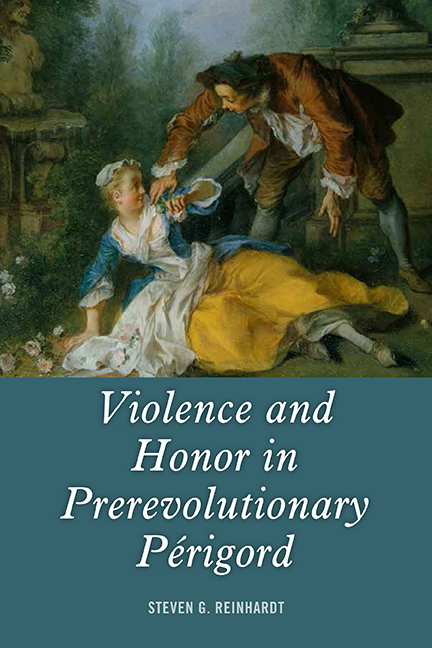Book contents
- Frontmatter
- Dedication
- Contents
- Acknowledgments
- Maps
- Introduction: “The Saint of Honor”
- 1 Violence and Honor
- 2 Honor in a Cross-Cultural Context
- 3 From Honor to Honnêteté in Old Regime Europe
- 4 “The Good Old Days” in Prerevolutionary Sarladais
- 5 “The Saint of Honor” in the Sénéchaussée of Sarlat
- 6 Women and Honor-Related Criminal Affaires
- 7 Policing Honnêteté: Shameful, Sinful, and Criminal Conduct
- 8 “Fallen Women” and Infanticide
- 9 Compromised Honor and Dangerous Liaisons
- 10 Honor and Homicide
- Conclusion
- Notes
- Bibliography
- Index
9 - Compromised Honor and Dangerous Liaisons
Published online by Cambridge University Press: 10 June 2021
- Frontmatter
- Dedication
- Contents
- Acknowledgments
- Maps
- Introduction: “The Saint of Honor”
- 1 Violence and Honor
- 2 Honor in a Cross-Cultural Context
- 3 From Honor to Honnêteté in Old Regime Europe
- 4 “The Good Old Days” in Prerevolutionary Sarladais
- 5 “The Saint of Honor” in the Sénéchaussée of Sarlat
- 6 Women and Honor-Related Criminal Affaires
- 7 Policing Honnêteté: Shameful, Sinful, and Criminal Conduct
- 8 “Fallen Women” and Infanticide
- 9 Compromised Honor and Dangerous Liaisons
- 10 Honor and Homicide
- Conclusion
- Notes
- Bibliography
- Index
Summary
Inhabitants of the Sarladais were ensnared in an elaborate web of honor that was especially dense where marriage and amatory affairs were involved. The eighteenth century may, in theory, have placed a higher value on conjugal love, but mostly this new emphasis on the importance of love between prospective spouses benefited men; in practice, the old rules and restrictions still applied to the overwhelming majority of the population. As a result, freer love for men translated into increased precariousness for young women, who were no longer as protected from the outcome. Unlike men, they could not afford to think about their individual desires; most often, they still thought in terms of their honor, that is, their duties and obligations to the family, clan, and community. Since male and especially female honor were still held at a premium, those who transgressed the respective obligations of their gender risked harsh reprobation. A woman's honor demanded that she be free of any blemish or even suspicion. The men of the family—fathers and brothers, and, later, husbands—considered it a point of honor to supervise the conduct and appearance of daughters, sisters, and wives to safeguard their reputations. At all public gatherings (e.g., fêtes, weddings, market days), brothers kept sisters from engaging in unseemly conduct and frequenting undesirable young men and thereby placing family honor at risk. Beyond the protective umbrella of her family, a young woman might naïvely feel a sense of liberation, but she actually became all the more vulnerable to depredation. Early modern French society (especially in the Midi) still tended to view an unaccompanied female as naturally weak and in need of surveillance. Without male supervision and protection, she had to suffer the consequences.
A respectable young woman living under the watchful eye of her family also had to be constantly wary of young men who might divert her from what her family considered an advantageous or at least appropriate match. If she received publicly witnessed promises of marriage and then proceeded to yield to her lover's amatory advances, she was still thought to have retained her honor because honnêteté also demanded fidelity to one's lover.
- Type
- Chapter
- Information
- Violence and Honor in Prerevolutionary Périgord , pp. 195 - 216Publisher: Boydell & BrewerPrint publication year: 2018

